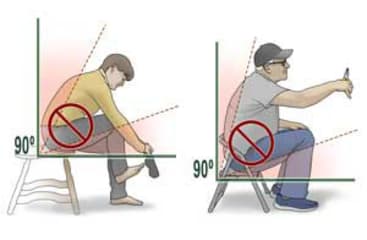Your Recovery
You will need to be careful to protect your new joint after hip replacement surgery. Along with doing your physical therapy exercises, there are many things you can do to help your hip heal. Your recovery may be faster if you follow these precautions.
Try to keep your hip within the safe positions while it heals. Some leg and foot movements may increase the risk of dislocating your hip. Try to avoid those positions.
How can you care for yourself at home?

- Keep your toes pointing forward or slightly out. Don't rotate your leg too far to the inside.
- Do not bend your hip more than 90 degrees.
- Keep your knees apart. Don't cross your legs.

- Don't lean forward while you sit down or stand up, and don't bend past 90 degrees (like the angle in a letter "L"). This means you can't try to pick up something off the floor or bend down to tie your shoes.
- Don't lift your knee higher than your hip.
- Don't sit on low chairs, beds, or toilets. You may want to use a raised toilet seat for a while. Sit in chairs with arms.

- Imagine there's a line running down the middle of your body. Keep your legs from crossing over it.
- Don't cross your legs when you sit.
- Don't cross your ankles while lying down.
- It may help to keep a pillow between your knees when you're in bed.
- When you get into a car, back up to the seat of the car, and then sit and slide across the seat toward the middle of the car with your knees about 12 inches apart. A plastic bag on the seat can help you slide in and out of the car.
Other tips
- Go slowly when you climb stairs. Make sure the lights are on. Have someone watch you, if you can. When you climb stairs:
- Step up first with your unaffected leg. Then bring the affected leg up to the same step. Bring your crutches or cane up.
- To go down stairs, reverse the order. First, put your crutches or cane on the lower step. Then bring the affected leg down to that step. Finally, step down with the unaffected leg.
- You can ride in a car, but stop at least once every hour to get out and walk around.
- You may want to sleep on your back. Don't reach down too far to pull up blankets when you lie in bed.
- If your doctor recommends exercises, do them as directed. You can cut back on your exercises if your muscles start to ache, but don't stop doing them.
Follow-up care is a key part of your treatment and safety. Be sure to make and go to all appointments, and contact your doctor if you are having problems. It's also a good idea to know your test results and keep a list of the medicines you take.
When should you call for help?
Call 911 anytime you think you may need emergency care. For example, call if:
- You passed out (lost consciousness).
- You have sudden chest pain and shortness of breath, or you cough up blood.
- You have severe trouble breathing.
Contact your doctor now or seek immediate medical care if:
- You have signs that your hip may be dislocated, including:
- Severe pain and not being able to stand.
- A crooked leg that looks like your hip is out of position.
- Not being able to bend or straighten your leg.
- Your leg or foot is cool or pale or changes color.
- You have tingling, weakness, or numbness in your leg or foot.
- You have symptoms of a blood clot, such as:
- Pain in your calf, back of the knee, thigh, or groin.
- Swelling in your leg or groin.
- A color change on the leg or groin. The skin may be reddish or purplish.
- You have pain that does not get better after you take pain medicine.
- You have loose stitches, or your incision comes open.
- You are bleeding from the incision.
- You have symptoms of infection, such as:
- Increased pain, swelling, warmth, or redness.
- Red streaks leading from the incision.
- Pus draining from the incision.
- A fever.
Watch closely for changes in your health, and be sure to contact your doctor if:
- You do not have a bowel movement after taking a laxative.
- You do not get better as expected.
Current as of: July 24, 2025
Author: Ignite Healthwise, LLC Staff
Clinical Review Board
All Ignite Healthwise, LLC education is reviewed by a team that includes physicians, nurses, advanced practitioners, registered dieticians, and other healthcare professionals.

